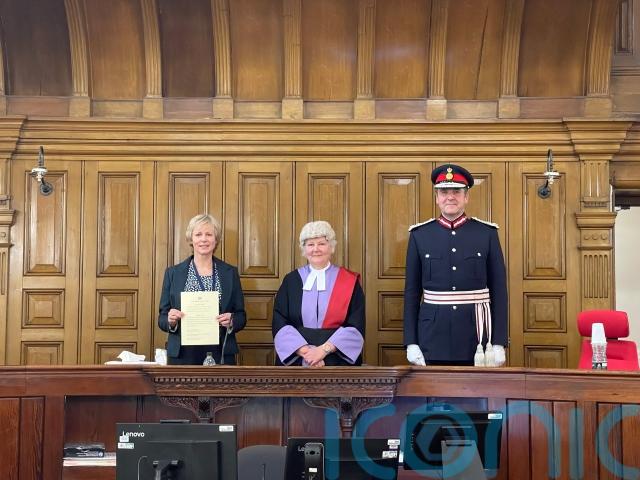
A mother and daughter who volunteer as magistrates in their spare time, dealing with crimes including drink-driving and theft and passing murder cases to the Crown Court, have said “it’s not all about punishment”.
Sally, 62, who is semi-retired but works in the Coroner’s Service, and her daughter Anna, 25, an airline pilot, from West Sussex, both applied and became magistrates on the same day – volunteers who hear cases in courts in their community.
From crimes ranging from common assault and criminal damage to theft and burglary, the pair can deal with up to a dozen cases in a day but, no matter the offence, Sally said everyone has a “unique human story” and rehabilitation is vital.
While the duo were close before, Anna said becoming magistrates has been a “bonding experience”, enabled them to “build (their) knowledge base together” and learn how to “step away from (their) biases” to make fair and honest decisions.

Learning about “equal access to justice” has been particularly valuable for Anna, who was the victim of a crime herself, as she was “hit over the head” with a glass bottle during a “random attack” on a night out.
While being a magistrate can be challenging, particularly when giving prison sentences for more serious offences, the pair, who do not wish to disclose their surname for privacy reasons, described the role as “fulfilling”.
Anna told PA Real Life: “When people find out I’m a magistrate, there’s the initial shock factor, with people saying, ‘Oh my God… you can be a non-lawyer and dish out justice?’
“I think that’s because they just don’t assume that they themselves could do it.
“You can just be a normal person and do this, it’s a voluntary role.”

Sally added: “Anybody aged between 18 and 74 can apply to be a magistrate – you’re ultimately trying to reflect the society that you live and work in.”
Anna wanted to become a dentist and started studying dentistry at university – until she saw a Royal Air Force (RAF) flying group for students at the Freshers’ Fair.
She then left university to pursue a career in aviation, following in her father Simon’s footsteps, as he was a pilot.
She said being a pilot gives her “the best office view”, describing it as “unbeatable”.

“I started (the five-year course at university), but teeth weren’t for me, personally,” she explained.
“I effectively joined an RAF flying group for students at university… did some flying with them and never looked back.”
For Sally, she said she worked as an air stewardess years ago, before going to university, having legal training and working in HR for more than a decade.
When Simon retired, aged 65, Sally considered her own retirement path, but she ended up joining the Coroner’s Service and now works as a coroner part-time.

“Here we are, in our 60s, but you can do something very new and very different and learn new skills – I truly believe that,” Sally said.
Sally’s open-minded approach and curiosity led her to investigate becoming a magistrate – a volunteer who hears cases in the criminal and family courts.
Contrary to what some might think, people do not need formal qualifications or legal training to become a magistrate, as they receive full training for the role, and a legal adviser in court will help with any questions about the law.
Applicants just need to be aged between 18 and 74, as magistrates must retire at 75, and they need to be able to sit in court for at least 13 full days a year.

In the autumn of 2021, Sally saw there was a recruitment drive for magistrates and, as part of her application, she needed to observe a day of court cases – and Anna decided to join her.
Sally had sat in a courtroom previously, where she heard of a “police dog being deployed to track a burglar across fields”, and this “sparked the interest” many years ago.
It was Anna’s first time in court, however, and she said she found it “fascinating” hearing the range of cases, which focused on remand issues – whether someone is kept in custody or released on bail until their next court appearance.
“It was my very first experience being in a court and that was through just tagging along with my mum,” Anna said.
“Then I thought, ‘Oh, actually, if my mum’s doing it, then why can’t I?’.”

The pair completed their applications and went through the necessary stages, including interviews, but Sally admitted she feared she would lose the role to Anna.
In March 2022, however, both were sworn in and officially became magistrates on the same day, and they have since completed their minimum of 13 full days in court per year.
All criminal cases start in a magistrates’ court and cases are usually heard by either three magistrates or a district judge.
Sally and Anna will handle summary offences, which are less severe and include most motoring offences and common assault; either way offences, like burglary, which can be heard in a magistrates’ court or Crown Court; or they will pass indictable offences, the most serious crimes, to the Crown Court, and these include murder, rape and robbery.
Sentences a magistrates’ court can give include a fine, a community sentence, a ban or imprisonment.

While they feel the responsibility of the role, they find volunteering as a magistrate “fulfilling” as they are “giving back to the community” – although they both work in separate courts across their county.
Anna said: “If we give someone a prison sentence, we do recognise that that is changing, and potentially will change, someone’s life drastically.
“That is a sobering thought, and we all recognise the weight of that and the huge responsibility that we have.
“But I think it’s important to realise as well, you’re making a decision in a three, so you’ve got a team with you.
“We’re guided by legal sentencing guidelines, and we’ve got a legal adviser to check the legalities.”

Sally added: “It’s really structured decision-making, so none of it is any gut reaction.
“And being magistrate, it’s not all about punishment.
“There’s rehabilitation as well in there… where you feel you can make a difference and help people break a cycle of crime.”
Since Anna works different shifts as a pilot, she enjoys the flexibility of being a magistrate, and for Sally, she can organise her days in court around her schedule and part-time job.

They said other people have been left “surprised” that they are magistrates, and they have had to explain that the role does not involve wearing wigs and is “nothing like the TV”.
Magistrates wear smart attire, the pair explained, and the proceedings are all “very polite and very civilised”.
Anna said: “With all these films, you see people shouting, ‘objection!’, and it’s all nasty – there’s absolutely none of that.”
They both said they love the “diversity” of the people who volunteer as magistrates, as this helps them understand different perspectives.
Moreover, they have had the opportunity to do prison visits and lessons in schools and see how community orders can help offenders rehabilitate.

Sally said she will continue volunteering as a magistrate until she retires completely, as it “keeps you on your toes”, and Anna will keep going for the foreseeable, too.
Speaking about their advice to others considering becoming a magistrate, Anna said: “The process might seem daunting, but register your interest first and take one step at a time.
“There are no legal qualifications required… and it’s very fulfilling.”
Speaking about her favourite aspect, Sally added: “It’s about giving back to community, but equally, it gives something back to me as a person.”
Subscribe or register today to discover more from DonegalLive.ie
Buy the e-paper of the Donegal Democrat, Donegal People's Press, Donegal Post and Inish Times here for instant access to Donegal's premier news titles.
Keep up with the latest news from Donegal with our daily newsletter featuring the most important stories of the day delivered to your inbox every evening at 5pm.